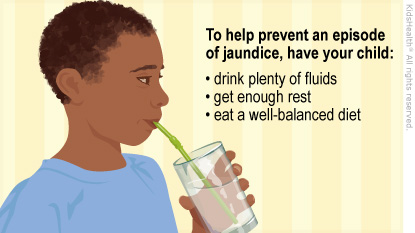Gilbert's syndrome is a liver condition that causes someone to have episodes of jaundice (yellowing of the whites of the eyes and skin). The jaundice happens because the body doesn't properly process bilirubin (a yellowish substance made during the breakdown of red blood cells) and it builds up. Jaundice is more likely to happen during illness, stress, dehydration, overexertion, menstrual periods, while taking some medicines, or when not eating enough. No treatment is needed for Gilbert's (zheel-BAIRS) syndrome, but you can help your child prevent jaundice.




Why do people with Gilbert's syndrome get jaundice? Normally when blood goes through the liver, an enzyme changes the bilirubin into a form that can leave the body in poop and pee. Enzymes are proteins that help with chemical reactions in the body. People with Gilbert's syndrome don't have this enzyme. So, bilirubin can't be processed normally and the body can't get rid of it. The bilirubin builds up in the blood and leads to jaundice.
How do people get Gilbert's syndrome? People who have Gilbert's syndrome are born with it. Parents can pass it to their children through genes. But sometimes a child can get it without a family member having it.
Can Gilbert's syndrome lead to problems? People with Gilbert's syndrome are otherwise healthy. Adults and children with Gilbert's syndrome are more likely to get gallstones (hard, pebble-like "stones" that form in the gallbladder). Babies may have jaundice that lasts longer than usual. Gallstones and jaundice in babies are easy to treat.